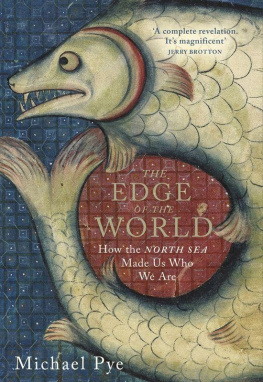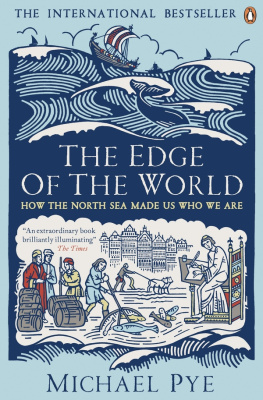Michael Pye - The Edge of the World:A Cultural History of the North Sea and the Transformation of Europe
Here you can read online Michael Pye - The Edge of the World:A Cultural History of the North Sea and the Transformation of Europe full text of the book (entire story) in english for free. Download pdf and epub, get meaning, cover and reviews about this ebook. year: 2015, publisher: Pegasus, genre: History. Description of the work, (preface) as well as reviews are available. Best literature library LitArk.com created for fans of good reading and offers a wide selection of genres:
Romance novel
Science fiction
Adventure
Detective
Science
History
Home and family
Prose
Art
Politics
Computer
Non-fiction
Religion
Business
Children
Humor
Choose a favorite category and find really read worthwhile books. Enjoy immersion in the world of imagination, feel the emotions of the characters or learn something new for yourself, make an fascinating discovery.
- Book:The Edge of the World:A Cultural History of the North Sea and the Transformation of Europe
- Author:
- Publisher:Pegasus
- Genre:
- Year:2015
- Rating:5 / 5
- Favourites:Add to favourites
- Your mark:
- 100
- 1
- 2
- 3
- 4
- 5
The Edge of the World:A Cultural History of the North Sea and the Transformation of Europe: summary, description and annotation
We offer to read an annotation, description, summary or preface (depends on what the author of the book "The Edge of the World:A Cultural History of the North Sea and the Transformation of Europe" wrote himself). If you haven't found the necessary information about the book — write in the comments, we will try to find it.
The Edge of the World:A Cultural History of the North Sea and the Transformation of Europe — read online for free the complete book (whole text) full work
Below is the text of the book, divided by pages. System saving the place of the last page read, allows you to conveniently read the book "The Edge of the World:A Cultural History of the North Sea and the Transformation of Europe" online for free, without having to search again every time where you left off. Put a bookmark, and you can go to the page where you finished reading at any time.
Font size:
Interval:
Bookmark:




Cecil Warburton went to the seaside in the summer of 1700: two weeks at Scarborough on the east coast of England, north of Hull and south of Newcastle. He was not at all impressed.
He was a northern gentleman, son of a Cheshire baronet, and he did what gentlemen do at a spa: he drank down five pints of the famous waters almost every day, waters that smelled of ink and tasted of acid, and his system was duly flushed. He refused the full cure his companions took, which was four quarts a day. He wrote to his brother-in-law: I was in hopes I might here have met with something would have made my letter diverting to you, but I find myself disappointed for I yet can see nothing but coarse hooks and drying fish which is all the furniture of both in and out side of their streets and houses. The streets were littered with garbage of fish and Cods Heads I wish you find no ungreatful smell inclosed, for I think it impossible any thing can go hence free from it.
Hed chosen the town where the idea of seaside was starting, where the first changing huts were about to appear on the beach, where people came to flirt and be seen; he did not want reminders of all the uses of the working sea. People, Nobility, Quality and Gentry according to the guide for 1733, were flocking to Scarborough: earls and baronets, misses and marchionesses. They drank and ate and drank, knowing the waters would wash them out and keep them well. They went swimming in the cold sea and horse racing on the long, wide sands and dancing in the evening.
They chose to see the spa and not the working town, not the castle that had fired on enemy ships only fifty years earlier when the Dutch and English were at war, not the fishing fleet of maybe three hundred boats or the harbour, the only practical refuge in foul weather between the River Tyne to the north and the River Humber to the south. The town was a reminder of the web of connections over the water: food, trade, war and all kinds of arrivals and invasions, including the invasions of ideas.
Cecil Warburton, like millions after him, had no interest in all that. He had more immediate worries; as he complained in a letter to his sister: am still as fat as ever
This new idea of seaside came between us and the story of the sea. The seaside was becoming a destination, not a harbour on the way to somewhere else over the water; and it was a playground, not a place of work and war. It was hard to imagine that there had once been a world that centred on the sea itself. Over the years even the coastline was fixed in place as it never used to be when high winds could make a storm out of the sand, and high tides could break deep into the land. Stone and then concrete made sea walls, promenades, esplanades, a definite squared-off boundary between man and sea. Behind them, seafront hotels and villas could stare out with perfect indifference at the sea, which had made them so desirable in the first place.
That was just beginning in Warburtons time. In Scarborough, a whole catalogue of grand persons paid their five shillings and signed the book to use the two rooms built on the beach for drinks and company and dressing and undressing. They came north from London by the York coach, or else by way of Cambridge for the sights, but only if they could tolerate the country inns. Otherwise they paid a guinea for passage from the docks at Billingsgate to Scarborough on one of the coal boats going back empty from London to the Tyne.
The women bathed discreetly with the help of guides. A local poet complained that A spreading Vest the nymph secures / And every prying glance defies. The men could either retire and undress at some distance from the company, or push a little off the beach in boats and then jump in naked directly. The sea was considered safe enough for brisk exercise or medicinal baths. Indeed, the anonymous author of A Journey from London to Scarborough insisted: What Virtues our Physicians ascribe to Cold Baths in general are much more effectual by the additional Weight of Salt in Sea water, an Advantage which no Spaw in England can boast of but Scarborough.
Seawater, like spa water, was meant to cure sickness. Doctors were immediately and deeply worried; water was a rival to the chemical
Now waters had once been a matter of another kind of faith: holy waters, holy springs and wells, found by saints and other amateur hopefuls. Scarboroughs spring was first found, or so a Dr Wittie wrote in 1667, by a Mrs Farrow, who was walking on the beach in the 1620s and noticed that stones had been turned russet by a noisy, bubbling spring at the foot of an exceedingly high cliffe. She liked the taste of the waters. She thought they would do people good.
Word spread.
Dr Wittie wrote a little book to make sure that it was doctors who prescribed them. He already believed in bathing because that was what the English did at spas: they drank the waters, but they also bathed in them, unlike the Europeans, who thought drinking was quite enough. He told men with a taste for port wine to go swimming in the sea because that was how he had cured his own gout, frequent bathing in the Sea-water cold, in Summer time after which I take a Sweat in a warm bed. The summer months were the best; Dr Wittie was quite shocked that in German spas, they drink in winter.
He knew that many go to the spaws not for necessity but for pleasure, to withdraw themselves a while from their serious imployments and solace with their friends. But pleasure, too, was going to be the business of doctors: a modern profession staking claims on as much of life as possible. Swimming itself was no longer simple exercise. Dr Robert White wrote on the Use and Abuse of Sea Water in 1775 to warn that they who are in full health and strength should not sport with such recreations so freely. They could perhaps bathe early in the day, but the more nervous cases should wait until a little before noon; nobody should continue above a minute in the water. Seawater might be less of a shock than the stone cold of spring water, but even so Dr White felt obliged to warn of the Fatal Effects of Bathing in Healthy Persons. He told how a man, about 40 years of age, who had lived a sober and temperate life, was induced to bathe in the sea. The man didnt think of himself as a patient so he went into the water without being bled and without being purged, and without a doctors say-so; the consequence, so Dr White says, was violent pain which shot through his head, great dizziness and a fatal Apoplectic fit.
The sea was useful against leprosy, he thought, of great use against epilepsy, and able to take away jaundice. The sea could also cure gonorrhoea, which might be a comforting thought for randy gentlemen but no consolation at all for the next person they bedded. Even so, he reckoned people were not careful enough with so general and popular a Medicine because the Stomach and Bowels are kept in constant agitation by it. He recorded the propensity which people of all ranks have discovered towards Sea Bathing.
Font size:
Interval:
Bookmark:
Similar books «The Edge of the World:A Cultural History of the North Sea and the Transformation of Europe»
Look at similar books to The Edge of the World:A Cultural History of the North Sea and the Transformation of Europe. We have selected literature similar in name and meaning in the hope of providing readers with more options to find new, interesting, not yet read works.
Discussion, reviews of the book The Edge of the World:A Cultural History of the North Sea and the Transformation of Europe and just readers' own opinions. Leave your comments, write what you think about the work, its meaning or the main characters. Specify what exactly you liked and what you didn't like, and why you think so.












